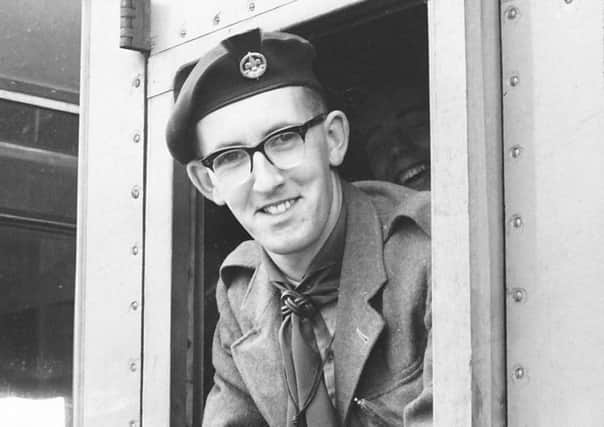Albert celebrates another great milestone


With a raft of training under his belt, Albert went from Cub Scout to Scout proper before going into the administration side, and has been a district officer in various forms now for six decades, Albert actually joined the Cubs in All Saints Clooney on April 4, 1946.
“My brother was in the Scouts and that is where I got the interest,” said Albert, looking down at the paperwork with which he was issued that April day.
Advertisement
Hide AdAdvertisement
Hide AdAs anyone who knows Albert will attest, he is a meticulous record keeper, so it is no surprise that he has the very documents to hand - and is able to produce them even to this day!


“In 1947 he left the city to go to Belfast because he worked in the shipyard and it closed down.
“I left and went into the Scouts then on June 20, 1949. That was in All Saints Clooney and then I became an assistant Scout Master with All Saints Clooney on October 6, 1955. You had to be 18 to take on a leadership role; you couldn’t be a leader at 13 or 14.
“I joined because it was fun and you were learning something and you had the ability to put something back into the movement and it was just a great interest to me. In those days you had no TV to sit watching, so you had something to go out to on a Friday night. Most troops in those days met on Friday nights and in those days you wanted to get out because you had nothing at your home to interest you; you had radios but, certainly in those days you talked more to people and it was fun then to get out.
Advertisement
Hide AdAdvertisement
Hide Ad“During the summer you got outdoors and particularly in our troop we went down to the woods in Gransha and lit our fires and boiled water, did a bit of cooking and then in the summer you went off for one week or two weeks to summer camp.”


Highlights for Albert include, in 1957, the Centenary of the Founder Lord Baden-Powell, which was also the 50th anniversary of the formation of the Scout movement, which was celebrated with a massive Jamboree in Sutton Coldfield and there was 30,000 there from all around the world.
“Most of us who went there had a job to do, and its hard to believe it, but my job was car park attendant.
The highlight of the event was the amount of rain that came down and the whole ground was just mud, mud and more mud, and British Rail sent in loads of wooden sleepers to put down so that people could get walking about without sinking into the mud.
Advertisement
Hide AdAdvertisement
Hide Ad“On the way back home again, the train was late, so I missed my boat and staging to Belfast and ended up in Bangor in North Wales with a landslide to boot and got home a day later...”


“It was a great experience that Jamboree,” he said.
“When Scouting was 100 years old in 2007, I went on a one-day trip to a Jamboree, which was held in Essex in England.”
One really big difference over the years is that girls are now allowed into Scouting.
“It is amazing that the Scouts have taken girls in where Guiding has never taken boys in. I have often wondered about that, and if the Guides were happy with the Scouts taking the girls,” he said, pondering the conundrum...


Advertisement
Hide AdAdvertisement
Hide AdIn 1960 Albert went to a World Scouters Camp in Holland. It was the Third World Scouters Camp, but there has never been one since. It was given the name ‘Indaba’ meaning a meeting of the chiefs.
In an interesting aside, HM The Queen is the Patron of the Scouting Association and its President is the Duke of Kent.
The Chief Scout back in the day was Lord Llewellyn, the current Chief Scout is British adventurer and TV presenter Bear Grylls. The use of younger role models is something that sits well with Albert, as he thinks they have more relevance and inspirational appeal to young people.
“Bear Grylls is marvellous. He is a great leader,” he says.
Most of the rest of Albert’s connection with the Scouting Association was spent on the administration side of things - after Clooney he moved to Christ Church as an assistant Scout Master; he did a stint as Scout Master at Claremount in 1959 and then was involved in re-starting the Scouts at Clooney.
Advertisement
Hide AdAdvertisement
Hide AdHis memories of camping with his young charges, of teaching the boys life skills and of losing two boys on a trip away after they got off the train to get sweets and the train pulled off without them; or the time he took a troop away to Belfast and one boy decided to go and visit his grandmother, or the clutch of whippersnappers who decided they would rather go and see The Beatles rather than tour the sights of London... such were the joys of being a Scout leader.
It is not that long ago that the 50 and 60-year awards for services to scouting have been struck, and Albert is one of only two to receive a 50-year accolade for service, and the only one in Northern Ireland to have the 60-year award.
They don’t have a 70-year award just yet, but Albert is certainly shaping up to be the only Northern Ireland recipient of one of those as well...